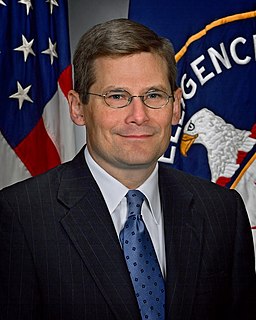A Quote by John McAfee
It's very hard to keep an uncrackable encryption if you share it with the government.
Quote Topics
Related Quotes
I think it's interesting because the 1990s ended with the government pretty much giving up. There was a recognition that encryption was important. In 2000, the government considerably loosened the export controls on encryption technology and really went about actively encouraging the use of encryption rather than discouraging it.
So, in 1993, in what was probably the first salvo of the first Crypto War, there was concern coming from the National Security Agency and the FBI that encryption would soon be incorporated into lots of communications devices, and that that would cause wiretaps to go dark. There was not that much commercial use of encryption at that point. Encryption, particularly for communications traffic, was mostly something done by the government.
Clipper took a relatively simple problem, encryption between two phones, and turned it into a much more complex problem, encryption between two phones but that can be decrypted by the government under certain conditions and, by making the problem that complicated, that made it very easy for subtle flaws to slip by unnoticed. I think it demonstrated that this problem is not just a tough public policy problem, but it's also a tough technical problem.
In this age of communications that span both distance and time, the only tool we have that approximates a 'whisper' is encryption. When I cannot whisper in my wife's ear or the ears of my business partners, and have to communicate electronically, then encryption is our tool to keep our secrets secret.
The reality is that if you - let's say you just pulled encryption. Let's ban it. Let's you and I ban it tomorrow. And so we sit in Congress and we say, thou shalt not have encryption. What happens then? Well, I would argue that the bad guys will use encryption from non-American companies, because they're pretty smart.
As all of our lives become digital, the logic of encryption is all of our lives will be covered by strong encryption, and therefore all of our lives - including the lives of criminals and terrorists and spies - will be in a place that is utterly unavailable to court-ordered process. And that, I think, to a democracy should be very, very concerning.
Joe and I are still very aware of the fact that we live in a country where he criticised the government and lived another day. That trumps all. To paraphrase Churchill, democracy is the worst form of government apart from all the other forms of government. You constantly have to fight for it; you have to keep your government honest.
Companies made these decisions about encryption when they were finding it very difficult to sell their products overseas because the [Edward] Snowden disclosures created the impression that the U.S. government was inside this hardware and software produced by them. They needed to do something to deal with the perception.
In a clean break from the Obama years, and frankly from the years before this president, we will keep federal spending at 20 percent of GDP, or less. That is enough. The choice is whether to put hard limits on economic growth, or hard limits on the size of government, and we choose to limit government.































